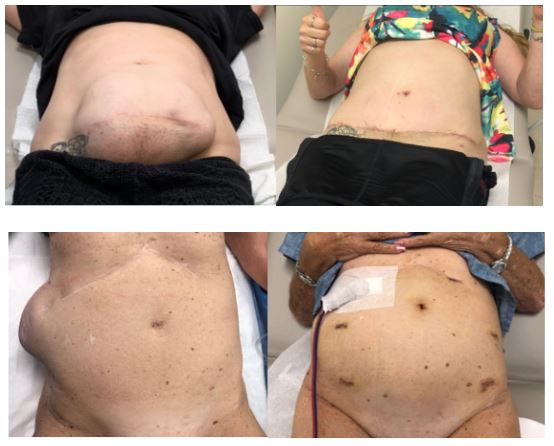Abdominal wall hernias, including groin hernias, can come in a wide array of shapes and forms. Some develop primarily from wear and tear of the abdominal wall, whereas others may develop at the incisions from prior surgeries. They do share one thing in
common - they are all mechanical defects of the abdominal wall musculature with the tendency to progress with time.
Early awareness and management of this disease is important, as some hernias can take an insidious course leading to inoperable or life-threatening hernia-related complications. From being asymptomatic to causing a small bowel obstruction requiring an
emergent surgery, risk stratification of patients with consideration of other comorbidities is critical for both perioperative and operative management to achieve outstanding long-term outcomes.
 Before and after abdominal wall reconstruction
Before and after abdominal wall reconstruction
With the recent advent of many novel techniques, the field of abdominal wall reconstruction has been rapidly evolving. There has been a paradigm shift of the treatment of hernias towards a wholistic approach to diminish hernia recurrence rates, looking
at the “whole” rather than solely the “hole.” This includes restoring native anatomy rather than just coverage of the hernia defect, which adds significant complexity to these procedures. Complex abdominal wall reconstruction
with minimally invasive surgery (MIS), including robotic technology, has continued to gain traction in the field. MIS has shown to decrease recovery time, length of hospital stay, and wound complications compared to open surgery. If indicated and
feasible, MIS should be routinely offered to patients given their proven benefit.
Although there is a clear benefit to MIS hernia repair, the learning curve is steep due to the need for advanced laparoscopic skills. This has been shown with the learning curve for an open inguinal hernia repair being far less than 100 cases compared
to laparoscopic repair with around triple the number of cases needed.
In our Division of Minimally Invasive and Foregut Surgery at UTMB Health, our fellowship trained physicians have expertise in abdominal wall reconstruction, offering a wide array of procedures from simple to complex, both with either MIS or open approaches.
Our team at UTMB Health can provide individualized approaches to hernias with the ultimate goal of achieving the best long-term outcomes for our patients.